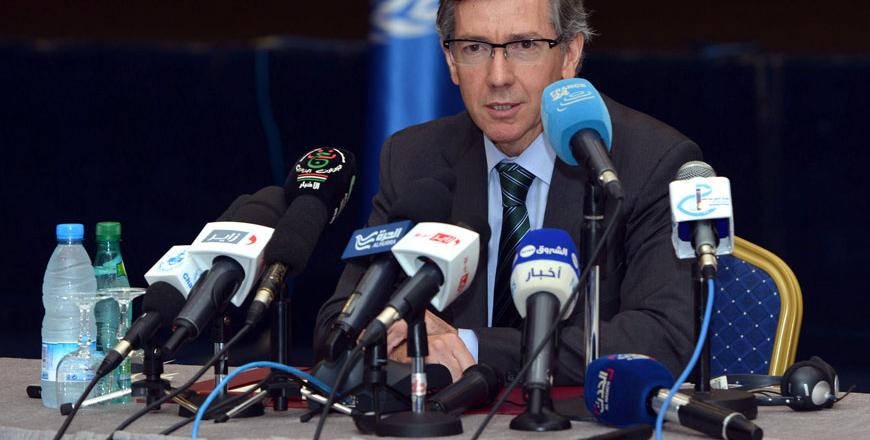You are here
Libyan unity talks resume as UN warns that time is running out
By Reuters - Jun 03,2015 - Last updated at Jun 04,2015

Special representative and head of the United Nations Support Mission in Libya, Bernardino Leon, delivers a speech during new UN-mediated peace talks between Libya’s feuding factions in the Algerian capital, Algiers, on Wednesday (AFP photo)
ALGIERS — Libyan politicians and activists resumed talks on Wednesday, aimed at forming a unity government to end the power struggle between two rival administrations that mediators fear could turn the North African country into a failed state.
Libya's neighbours and Western governments say the talks are the only way to resolve a conflict between the two governments and their armed forces battling for control of the OPEC oil producer where Islamist insurgents have exploited the chaos.
"To not reach an agreement and continue the confrontation is not an option," UN special envoy for Libya, Bernardino Leon, said at the talks in Algiers. "The country is really at its limit."
Tripoli is controlled by Libyan Dawn forces who set up their own unofficial government after taking the capital last year, leaving the internationally recognised government to operate out of the east of the country.
The talks, attended by political parties, activists, and representatives from Libyan regions, are meant to hammer out differences on a draft proposal for a unity government before a broader meeting expected in Morocco next week.
At the last talks in Morocco, the rival groups agreed on 80 per cent of an accord and negotiators were working on the remaining 20 per cent, UN officials said.
"This should be the final draft because may be this the final opportunity for Libya," Leon said. "It is a crucial time."
Abdulqader Al Jwaili, a representative of the Tripoli parliament, told Reuters his delegation would attend Morocco talks planned for June 7-8.
Implementing any agreement on the ground may prove complicated in Libya where various rival brigades of former rebels battle each other on several fronts. Attempts at a ceasefire have generally failed in the past.
Four years after a NATO-backed uprising that ousted Muammar Qadhafi, the conflict has battered Libya's oil industry and also allowed Daesh militants to gain a foothold in cities such as Derna and Sirte.
Both sides are under pressure as low oil production is quickly depleting government revenues that pay for salaries and food subsidies.
The growing Daesh presence worries European countries concerned about militants establishing a strong base just across the Mediterranean.
Libya is also a concern for the EU as migrants fleeing strife in the Middle East and Africa use Libya's coast to launch boats to cross the sea to Europe.
Related Articles
TRIPOLI — Hopes for a deal to form a unity government in war-torn Libya by a September 20 deadline received a boost Friday after UN-brokered
Talks between Libya's rival parliaments on forging a unity government for the violence-wracked country have been a "great success", the UN envoy said Tuesday, but there were no signs of a major breakthrough.
Rival Libyan forces carried out tit-for-tat air strikes on oil terminals and an airport on Tuesday, escalating their battle for control of the oil-producing country days before United Nations peace talks are to resume in Morocco.
















